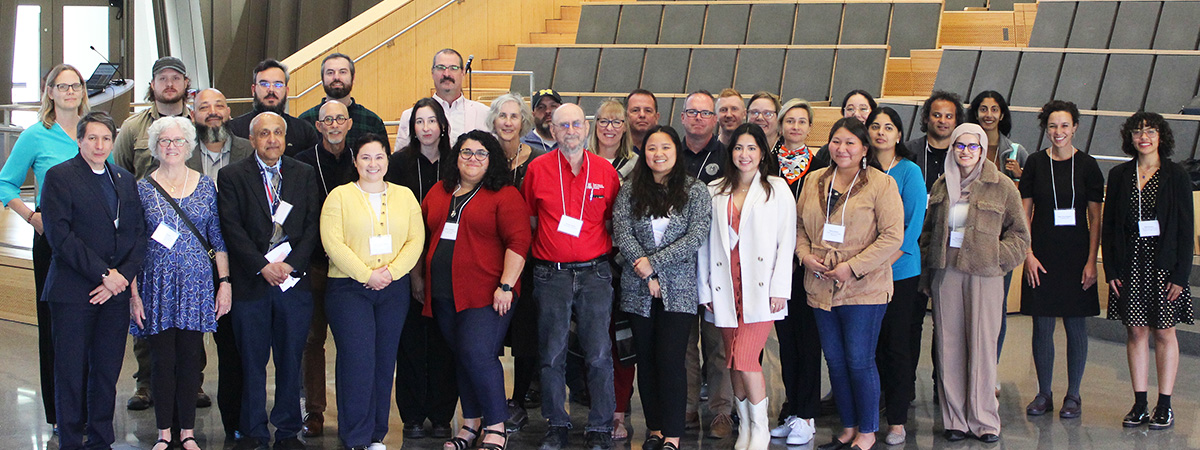Resilience Informatics Workshop Fosters Collaboration to Meet Climate-Driven Health Challenges

A Resilience Informatics Workshop at the University of Arizona brought together experts from many fields to discuss the current and potential use of digital data tools that can make communities more resilient in the face of health challenges resulting from climate change, pandemics, and man-made disasters.
In November 2023, the Zuckerman College of Public Health hosted a Resilience Informatics Workshop in collaboration with International Programs at the Arizona Institute for Resilience (AIR), the AZHEALTHTXT project at the Arizona Center for Rural Health, and the College of Medicine – Phoenix. The Workshop brought together experts from many fields of expertise to discuss using modern informatics tools and techniques to respond to the health effects of climate change, pandemics, and man-made disasters.
The workshop was funded by a Technology and Research Initiative Fund (TRIF) award from the Arizona Institute for Resilience (AIR), entitled “Resilience Informatics for Public Health,” awarded to PI Sriram Iyengar, PhD, Internal Medicine, University of Arizona College of Medicine – Phoenix and co-investigators.
In collaboration with Dr. Iyengar, faculty members Kacey Ernest, PhD, MPH, Mona Arora, PhD, MsPH, and doctoral student Maiya Ngaybe, MPH, all from the Zuckerman College of Public Health at the University of Arizona, organized the workshop with additional support from Greg Collins, PhD, MPH, and Liz Petterson, both from the Arizona Institute for Resilience (AIR) at the University of Arizona. Dr. Iyengar, Dr. Collins, and Petterson were all featured speakers.
The team from UArizona also collaborated with Mary Hayden, PhD, MA, from the Lyda Hill Institute for Human Resilience at the University of Colorado – Colorado Springs. Dr. Hayden gave an introductory presentation.
The workshop focused on the emerging field of resilience informatics for public health. Informatics tools integrate data with computer software tools to support decision-making based on evidence from data analytics. Resources used in informatics include data science, artificial intelligence (AI), digital mobile health platforms, data visualization software, and augmented and virtual reality.
A concept paper entitled Resilience Informatics for Public Health authored by Sriram Iyengar, Nirav Merchant, Kacey Ernst, Maiya Ngaybe, Stephen Rains, and Myla Gonzalez was presented by Sriram at MEDINFO 2023, the major meeting of biomedical informatics, held in July 2023 in Sydney, Australia. This paper received a best paper (3rd place) award.
The workshop featured more than 40 experts from a range of fields such as public health, medicine, weather, informatics, environmental science and resilience who each discussed how resilience informatics is able to improve and promote the ability of people, communities, and organizations to effectively cope with natural and man-made stressors.
Other speakers at the workshop included:
Jose Florez-Arango, MD, PhD, Assistant Professor of Population Health Sciences, Director of the MS in Health Informatics Program, Weill Cornell Medicine, presented on resilience in scholars and supporting children, parents, and teachers with mental health services.
Sameer Halai, MSI, Chief Executive Officer and Founder of WeHealth presented on his digital public health platform, WeHealth.
Antonio Hernandez, MEP, Office of Health Equity, Arizona Department of Health Services (ADHS) presented on The Social Vulnerability Index.
Andrew Martinez, Research Coordinator, Collaboratory for Indigenous Data Governance at the University of Arizona and citizen of the Salt River Pima-Maricopa Indian Community.
Enrique Noriega, PhD, MSc, Natural Language Processing and Machine Learning Scientist, AZHEALTHTXT, University of Arizona, presented on the AZHEALTHTXT platform.
The workshop focused on key questions about the use of modern informatics for resiliency, such as how to ensure equity, what tools are needed for resilience informatics, and barriers to technological solutions. The workshop participants all contributed to a final summary report and concluded that the tools used for Resilience Informatics need guidelines and must be equitable for all. These tools should also build empathy as a key factor for sustainable change. Detailed qualitative analysis of participants is now being conducted and will shortly be compiled into a paper credited to all participants.
Researchers from across the country came together for the Resilience Informatics Workshop, including representatives from Weill Cornell Medicine, the University of Colorado, and Northern Arizona University, in addition to experts from several University of Arizona units including the Arizona Center for Rural Health, the Zuckerman College of Public Health, the Arizona Institute for Resilience, the College of Medicine - Tucson and the College of Medicine - Phoenix. Thanks to all of the researchers who participated in this workshop to support the development of resilience informatics to help communities in need!

